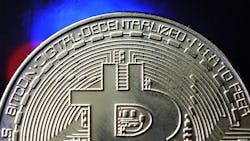Taiwan Semiconductor Manufacturing Co. is one of hundreds of companies that have benefited by supplying components for Apple Inc.’s iPhone over the past 10 years. Now the world’s biggest maker of bespoke microchips could see digital currencies like Bitcoin become even more important for its growth.
TSMC stands to benefit big-time from a boom in cryptocurrency mining driven by Bitcoin’s 1,400% leap last year — the same explosive growth that’s bolstered shares of designers from Nvidia Corp. to Advanced Micro Devices Inc. That’s a timely boost, as expectations for iPhone X shipments dwindle and Chinese smartphone demand tapers off. Crypto-mining could account for as much as one-tenth of TSMC’s revenue in 2018, becoming its fastest-growing segment.
Taiwan’s largest company is typically a barometer of iPhone demand, and will report its quarterly earnings Thursday. The producer of made-to-order semiconductors now gets about one-fifth of its sales overall from Apple as its main chipmaking partner. But crypto-miners’ contribution to the top line could well double this year to 5% to 10%, Nomura International analyst Aaron Jeng estimates. That’s because mining — the process of winning digital coins by crunching complex equations at the heart of virtual currencies like Bitcoin — requires the raw processing power of muscular chips that TSMC cranks out for companies like Nvidia and AMD.
“The mining impact on TSMC is now akin to that of a popular new iPhone,” said Mark Li, a Hong Kong-based analyst with Sanford C. Bernstein & Co. “The difference is that each new iPhone requires a huge amount of innovation and marketing. The Bitcoin contribution is automatic.”
Apple and the smartphone boom of recent years — particularly in China — helped drive a 69% gain in TSMC’s shares since the start of 2016. But a proliferation of vendors such as Oppo, Vivo and Xiaomi Corp. are saturating the country’s mobile device market with a plethora of new models, while adoption in rural markets slows. Chinese smartphone shipments slid almost 12% last year, government data showed.
Meanwhile, the digital currency arena has grown in importance for TSMC. It generated $350 million to $400 million of revenue from crypto-mining in the third quarter alone, co-CEO Mark Liu told investors. That’s about 4% to 5% of the period’s revenue, according to Bloomberg’s calculations.
There’s no guarantee crypto-mania will persist. Regulators from China to South Korea have been clamping down on virtual currency trading to curb financial risk. Miners themselves face disruption, forced to shift their operations as scrutiny over immense power usage tightens. Bitcoin dived as much as 25% Tuesday while rival cryptocurrencies also crumbled, including a drop of as much as 40% in Ripple.
“Although some investors are bullish that Bitcoin-related chipset demand could offset soft smartphone demand in 2018, we question whether Bitcoin demand will be sustainable” if prices slide, Benjamin Chiang, an analyst at KGI Securities, wrote last week.
In the longer term, the coin’s inherent scarcity — it’s capped at 21 million — also imposes an upper limit on chip demand. Once the majority of that is mined, chip demand will disappear, said Nomura’s Jeng. Till then, TSMC’s investors are treating cryptocurrency very much like a potential bonus that could be magnified in the near term.
“Cryptocurrency is like a call option for TSMC, which is an attractive investment on its own,” said Sebastian Hou, an analyst with CL Securities Taiwan Co. “If mining demand vanishes tomorrow, it shouldn’t affect the investment outlook. But if it turns out to be strong, the company will rake it in.”
About the Author
Bloomberg
Licensed content from Bloomberg, copyright 2016.
